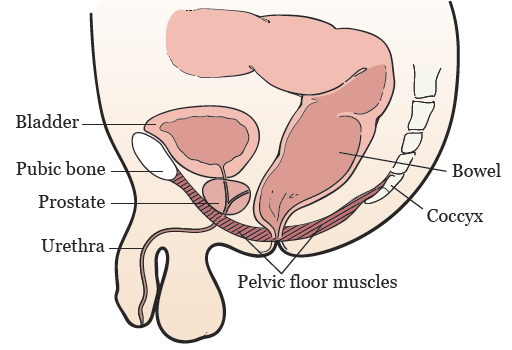Back
Stress Urinary Incontinence (SUI) in Men
By Shannon Strauch, PTA, STMT-1 on 5/21/2024

Stress incontinence in men occurs when there is involuntary leakage of urine during activities that increase abdominal pressure, such as coughing, sneezing, laughing, or physical exertion. This condition can be particularly frustrating and impact the quality of life. While stress incontinence is more common in women, men can also experience it, often due to specific factors such as:

Causes of Stress Incontinence in Men
Prostate Surgery
: The most common cause of stress incontinence in men is prostate surgery, particularly radical prostatectomy for prostate cancer. The surgery can affect the sphincter muscles that control urine flow.
Pelvic Floor Muscle Weakness
: Weakness in the pelvic floor muscles can result from aging, lack of exercise, or injury.
Nerve Damage
: Conditions such as diabetes, multiple sclerosis, or spinal cord injuries can lead to nerve damage that affects bladder control.
Radiation Therapy
: Treatment for prostate cancer can also involve radiation therapy, which can damage the tissues around the bladder and urethra, leading to incontinence.
Symptoms
Urine Leakage
: Involuntary leakage of urine during physical activities that increase abdominal pressure.
Frequency
: Needing to urinate more frequently due to incomplete bladder emptying.
Urgency
: A sudden, strong need to urinate.
Diagnosis
Diagnosing stress incontinence involves:
Medical History and Physical Examination
: Discussing symptoms and medical history with a healthcare provider.
Urinalysis
: Testing urine for signs of infection, blood, or other abnormalities.
Post-Void Residual Measurement
: Measuring the amount of urine left in the bladder after urination.
Urodynamic Testing
: Assessing the function of the bladder and urethra.
Cystoscopy
: Using a camera to look inside the bladder.
Treatment Options
Pelvic Floor Exercises (Kegels)
: Strengthening the pelvic floor muscles to improve bladder control, best instructed by a Pelvic Floor Physical Therapist
Medications
: Sometimes prescribed to improve bladder function or reduce symptoms.
Lifestyle Changes
: Losing weight, quitting smoking, and avoiding bladder irritants such as caffeine and alcohol.
Bladder Training
: Techniques to improve bladder control, including scheduled bathroom visits and double voiding, best instructed by a Pelvic Floor Physical Therapist
Surgical Options
: For severe cases, procedures such as sling surgery or artificial urinary sphincter implantation may be considered.
Preventive Measures
Regular Exercise
: Engaging in regular physical activity to maintain a healthy weight and strengthen muscles.
Avoiding Heavy Lifting
: Reducing activities that strain the pelvic floor.
Healthy Diet
: Consuming a diet rich in fiber to prevent constipation, which can worsen incontinence.
Pelvic Floor Therapy for Men
Pelvic floor therapy can be highly effective in managing stress incontinence in men. This therapy involves:
Pelvic Floor Muscle Training
: Guided exercises to strengthen the pelvic floor muscles.
Biofeedback
: Using sensors to provide feedback on muscle activity, helping to ensure exercises are done correctly.
Electrical Stimulation
: Using mild electrical currents to stimulate and strengthen pelvic floor muscles.
Stress incontinence in men can be challenging, but with appropriate treatment and lifestyle adjustments, many men can manage their symptoms effectively and improve their quality of life. If you're experiencing symptoms of stress incontinence, it's important to consult a healthcare provider to determine the best course of action. Looking to optimize your well being with pelvic floor physical therapy? Reach out to us at Pelvic Health Center in Madison, NJ to set up an evaluation and treatment! Feel free to call us at 908-443-9880 or email us at receptionmadison@pelvichealthnj.com.
Read More:
How Chronic Pelvic Congestion in Men Contributes to Prostatitis By Shannon Strauch, PTA, STMT-1 on 12/11/2024 How lymphatic issues can cause symptoms of prostatitis Prostatitis and Tight Pelvic Floor Muscles: A Comprehensive Guide By Shannon Strauch, PTA, STMT-1 on 12/10/2024 How a tight pelvic floor can be the reason for prostatitis symptoms
Are you ready to live pain free?
Request An Appointment